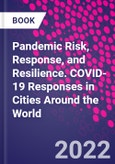Pandemic Risk, Response, and Resilience: COVID-19 Responses in Cities Around the World examines the pandemic's global impacts on public health, economies, society and labor. The book shows how COVID-19 intensified natural and anthropogenic hazards and destroyed years of communities, governments and the work of development organizations and their investments. It focuses on how disaster resilience is central to achieving the 2030 Sustainable Development Goals in a post-COVID-19 era. Sections cover current governance practices, with special attention given to Asia's more successful responses. It shows how the various sectors across that society were most impacted by COVID-19, including tourism and food systems.
This book is an essential reference for researchers and practitioners who need to understand response, preparedness and future pathways for pandemic resilience.
Please Note: This is an On Demand product, delivery may take up to 11 working days after payment has been received.
Table of Contents
PART 1: OVERVIEW AND NATIONAL GOVERNANCE RESPONSE
1. COVID pandemic, global spread, issues and challenges
2. Governance in the era of cascading risks: building systemic, multi-hazard multi-sectoral resilience approaches to build back better from COVID-19
3. Enhancing Risk Governance and Sustainability in times of COVID-19: Experiences and Repercussions from Thailand
4. Pandemic in the land of the Smile: The case of COVID-19 Outbreak in Thailand in 2020
5. Governance of disaster risk amid the COVID-19 pandemic in Central America: the case of Guatemala
6. National Perspectives of COVID-19: Case of Sri Lanka
7. Extent and Appraisal of COVID-19 Pandemic, Risk Governance and Resilience in Pakistan
8. Epidemics and Pandemics Risk Governance: A case of post COVID-19 in the UK
9. Risk governance, resilience, and response against COVID-19 in the Republic of Korea
10. Sri Lanka's fight against COVID-19: a brief overview
11. COVID-19 Pandemic in the Arctic and Sub Arctic
12. National perspectives of COVID-19 in the Maldives
13. Global pandemic governance in China: some reflections
14. Reflections on Pandemic Governance in Japan
PART 2: CAPACITY AND RESPONSE OF LOCAL GOVERNMENT
15, The Rohingyas in Bangladesh: The 2020 Pandemic and the aftermath
16, Guesstimating the COVID-19 burden: what is the best model?
17, Effective Measures in COVID-19 Prevention in Vietnam
18. Pandemic Management in Mountainous Regions; Challenges and Opportunities
19. Redefining Vulnerability and Resilience from the lens of COVID-19: A case study of Indian state of Bihar for COVID-19 Management
20. Uttar Pradesh
State level governance and response in COVID-19 pandemic
21.Development and Operationalization of Disaster Risk Management Framework for COVID-19 Pandemic: Quezon City Inclusive Unified Response, Recovery, and Rehabilitation Action Plan 2020-2030, Philippines
22. COVID-19 Risk governance in Megacities in Kolkata, India
PART 3: LIVELIHOODS
23. Village health volunteers response COVID-19 impact on fisheries and aquaculture in Thailand
24. COVID-19 reflections on response and resilience of agricultural food system value chain
25. Assessing the impact of COVID-19 to tourism and adaptation strategies
a case study in Thua Thien Hue, Vietnam
26. Positive externality matters in the COVID-19 pandemic: The case of women informal businesses in Pakistan
27. Impact of Coronavirus (COVID-19) on the Fisheries and Aquaculture Sectors of Ghana
28. COVID-19 National Response on Tourism Sector: A case study of Western Division of Vitilevu, Fiji Islands
PART 4: COMMUNITY, AWARENESS AND EDUCATION
29. Risk Management and Resilience of Schools in Response to the COVID-19 Pandemic
30. Disaster Resilience in Perspectives of Public Management, Human Adaptation, and Education for all in Thailand
31. Knowledge Gaps and Operational Challenges in Managing COVID-19 in Bangladesh: Post Pandemic Strategies in Multi-Disaster Contexts
PART 5: CONCLUSION
32. COVID-19 pandemic, risk reduction and resilience measures








